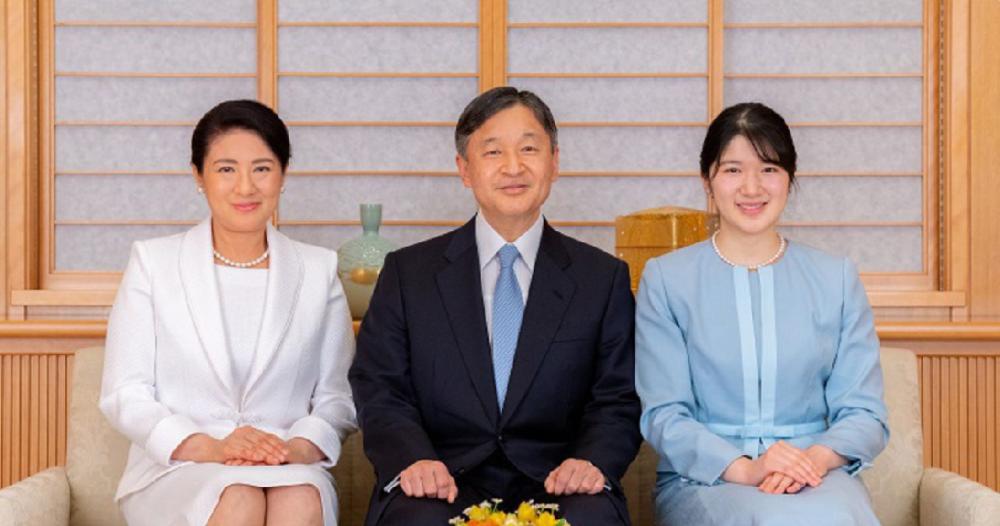A Few days ago, the New Year's celebration ceremony was held at the Imperial Palace in Japan, and for Princess Aiko it was the first official event in her adult life.

"As the emperor's only daughter, Princess Aiko has more opportunities to appear, which is something to be celebrated, but as a university student, Princess Aiko's time on official duties is limited," the Japanese reporter described.
Although the addition of Princess Aiko solved the "urgent need" for the reduction of the number of personnel in the Japanese imperial family, this was not a long-term solution.
With the departure of Princess Mako, the hidden problems in the Japanese imperial family became more and more obvious.
According to the current system (the proposal for a change is still under discussion), the next person to leave will be Princess Yoshiko, and the next one will be Princess Aiko.
This also means that in the near future, the Japanese imperial family will only have Prince Yuhito alone.
How to ensure the number of members of the imperial family is an urgent issue for the Japanese imperial family, so how to solve this problem?
After World War II, the original palace family was separated from the imperial family according to the new "Royal Model".
Therefore, the current five major palaces were all set up by the descendants of the Taisho Emperor, namely: Akisho Palace, Tokiryū Palace, Mikasa Palace, Katsura Palace, and Takamoto Palace.
Due to the decline of yin and yang, there are only three men who can inherit the throne today, these three are Prince Masahito of Tsunekaku Palace, Prince Wenren of Akishino Palace, and Prince Yuhito of Akishinoya.
It is worth noting that Prince Zhengren is already an 86-year-old man, and it is not realistic to pin his hopes on him.
Therefore, the only people who can pick up the beam are Wenren and Youren.
It is precisely for this reason that the Inner Chamber has a strong sense of crisis.
The adult Aiko had promised the people that I would do my best to assist His Majesty, but would Princess Aiko, now 20 years old, stay in the palace forever?
On 22 December, a measure to stabilize the succession to the throne was introduced, involving unmarried royal women, that is, unmarried princesses.
The first is to allow female members of the royal family to remain in the royal family after marriage; the second is to adopt male palace boys as adopted sons to ensure the number of royals; and the third is to recognize the status of the original male members of the royal family.
The members of the imperial family in article 3 refer to the pre-World War II miyaku family, whose blood lineage can be traced back to the Meiji Restoration era.
The proposal first and second articles were considered first and foremost, and article III would be taken into account last.
This will indeed allow the royal family to increase the number of "civil servants", but how feasible is the first and second?
Since the proposal could not have been adopted many years ago, can it be adopted today many years later?
According to the current plan, the conservatives will vigorously defend Yuhito's inheritance rights, which means that the possibility of a female emperor is extremely low, or the possibility of Princess Aiko wanting to ascend to the throne is almost minimal.
However, in such a high-pressure palace, who would want to marry Yujin?
It is well known that Empress Michiko and her former Concubine Masako both suffered from heart disease due to royal rules and inheritance pressures.
Such pressure is unimaginable for a royal family that has been under the pressure of a thousand years of succession, and sooner or later the Japanese imperial family will embark on the road of extinction.
It is worth mentioning that conservatives have always emphasized the male lineage of the Wanshi lineage, what if one day Yujin's wife gives birth to a girl? What if Princess Aiko gives birth to a boy?
Should this throne be passed on to Princess Aiko's children or to Yujin's children?
In fact, the biggest controversy in the proposal is whether a woman's husband and children should be counted as commoners or royals after marriage and remain in the royal family.
So is it feasible to adopt male palace boys?
Presumably, many people will wonder why a person who can be regarded as a commoner is still qualified to inherit the throne if he is already related to the emperor by blood.
The superiority of the "Ten Thousand Generations" bloodline adhered to by the Japanese conservatives makes people wonder, in fact, the emperor's bloodline has long been not a "clan" inheritance in the strict sense.
It is also ridiculous that conservatives who go against the tide will sooner or later kill themselves.